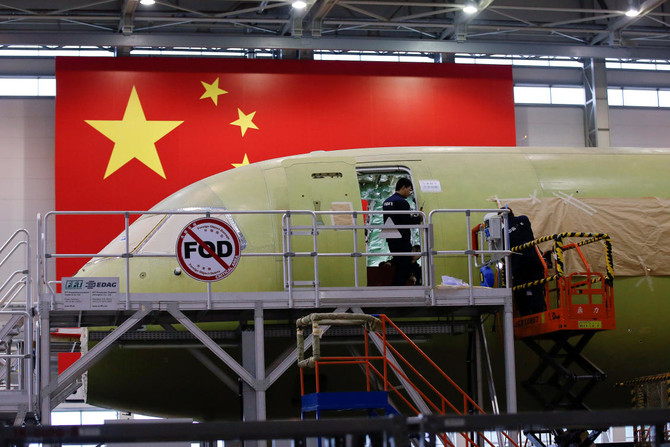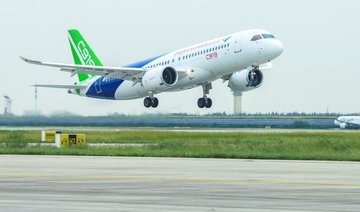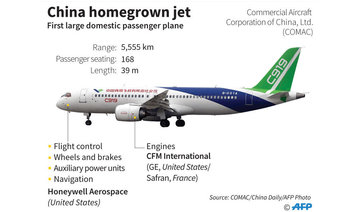SINGAPORE: The Commercial Aircraft Corp. of China (COMAC) on Tuesday said it was aiming to make the first delivery of its C919 single-aisle jet in 2021, despite delays in flight testing.
Lu Zheng, COMAC’s deputy general manager of sales and marketing, told reporters on the sidelines of the Singapore Airshow that the company expected Chinese certification to take three to four years. COMAC also has been speaking to US authorities.
“It should not have any impact” on the delivery time to the jet’s launch customer, China Eastern Airlines, he said. “We’re striving for 2021.”
The C919, which hopes to compete with Boeing Co’s 737 and the Airbus SE A320, is a symbol of China’s civil aerospace ambitions and President Xi Jinping’s push to upgrade manufacturing capabilities.
There was an almost five month-gap between the C919’s first and second flight, far longer than that of other new aircraft, which had raised concerns that COMAC’s plans to deliver the aircraft were running behind schedule. The plane has since undergone multiple tests, including a long-distance flight.
Lu also said US and European certification to come after it wins approval from Chinese regulators. Europe’s aviation safety regulator has started the certification process, but its US counterpart has not, he said.
He described recent partnerships between Airbus and Bombardier, as well as Boeing and Embraer as “normal,” but said that they would affect the markets its C919 and ARJ21 planes want to compete in.
“It will have an impact but they’ve also been impacted by us,” he said. “We will work hard to become, from a follower, to be a competitor, and in future, if we have the opportunity, to become a leader. But it’s a long road.”
The company does not plan to announce any orders at the Singapore Airshow, he added. But it planned to speak to potential customers from Southeast Asia.
The company, which is also co-developing a new wide-body jetliner with Russia, said in a statement that it had asked engine makers for proposals to supply the C929 jet’s propulsion system on December 21.
Russian officials have said the two countries expect to develop their own engine for the project.
China’s COMAC says first delivery of C919 jet planned for 2021
China’s COMAC says first delivery of C919 jet planned for 2021

BYD Americas CEO hails Middle East as ‘homeland for innovation’

- In an interview on the sidelines of Davos, Stella Li highlighted the region’s openness to new technologies and opportunities for growth
DAVOS: BYD Americas CEO Stella Li described the Middle East as a “homeland for innovation” during an interview with Arab News on the sidelines of the World Economic Forum.
The executive of the Chinese electric vehicle giant highlighted the region’s openness to new technologies and opportunities for growth.
“The people (are) very open. And then from the government, from everybody there, they are open to enjoy the technology,” she said.
BYD has accelerated its expansion of battery electric vehicles and plug-in hybrids across the Middle East and North Africa region, with a strong focus on Gulf Cooperation Council countries like the UAE and Saudi Arabia.
GCC EV markets, led by the UAE and Saudi Arabia, rank among the world’s fastest-growing. Saudi Arabia’s Public Investment Fund has been aggressively investing in the EV sector, backing Lucid Motors, launching its brand Ceer, and supporting charging infrastructure development.
However, EVs still account for just over 1 percent of total car sales, as high costs, limited charging infrastructure, and extreme weather remain challenges.
In summer 2025, BYD announced it was aiming to triple its Saudi footprint following Tesla’s entry, targeting 5,000 EV sales and 10 showrooms by late 2026.
“We commit a lot of investment there (in the region),” Li noted, adding that the company is building a robust dealer network and introducing cutting-edge technology.
Discussing growth plans, she envisioned Saudi Arabia and the wider Middle East as a potential “dreamland” for innovation — what she described as a regional “Silicon Valley.”
Talking about the EV ambitions of the Saudi government, she said: “If they set up (a) target, they will make (it) happen. Then they need a technology company like us to support their … 2030 Vision.”














